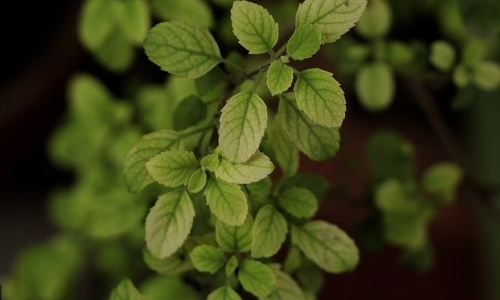Tulsi (also referred to as “Holy Basil”) is highly valued in Indian culture and Ayurvedic treatment. This holy plant, which is commonly seen in Indian homes, is admired for both its deep spiritual meaning. There are numerous health benefits of Tulsi are mentioned in Ayurveda.
Tulsi has been used for generations to treat various conditions, from minor colds to long-term illnesses, due to its powerful medicinal properties.
In Ayurveda, practitioners frequently refer to it as “the outstanding one,” highlighting its exceptional capacity to support complete health and balance the body’s systems. Beyond its medicinal properties, Tulsi is a common ingredient in spiritual rituals that symbolizes peace and purity.
In this article, we explore the several ways Tulsi may improve the quality of life, including how it can strengthen immunity, reduce stress levels, promote respiratory health and more.
The Ayurvedic Significance of Tulsi
In ayurveda, people consider tulsi a powerful antioxidant and a natural treatment for many problems. As a Rasayana, this adaptive plant can support an individual’s development toward life and energy.
People have long used tulsi to support possible mental and physical health, increase stress tolerance, and strengthen the immune system. Because of its numerous medicinal uses, it’s a mainstay of Ayurvedic medicine, where it is used to treat a wide range of conditions, from digestive problems to respiratory illnesses.
It also assists in maintaining & improving your overall health. By helping the body respond to different stimulations, Tulsi’s adaptogenic properties support harmony and balance in both the body and the mind.
Health Benefits of Tulsi
Here are the key health benefits of Tulsi:
Increases Resistance
The immune system-boosting properties of Tulsi are among its most well-known advantages. Being abundant in antioxidants and essential oils, Tulsi helps the body fight against illnesses.
Due to its immune-modulating qualities, it works well as a preventative measure against respiratory infections, such as the flu and common colds. Drinking Tulsi tea daily or including its leaves in your food will significantly improve your immune system.
Reduces Anxiety and Stress
Tulsi is well known for having adaptogenic qualities, which support mental equilibrium and assist the body in adjusting to stress.
The plant promotes calmness and relaxation by reducing levels of cortisol, which are connected to stress. Taking Tulsi tea can help with anxiety management and mental health enhancement in general.
Encourages Healthy Respiration
Traditionally, people use tulsi to treat respiratory problems like sinus infections, pneumonia, and asthma. Its anti-inflammatory, antibacterial, and stimulant qualities make breathing easier and clear the respiratory system. Tulsi is a fantastic treatment for preserving respiratory health because of its capacity to reduce inflammation and fight infections.
Encourages Heart Health
The anti-inflammatory and antioxidant qualities of Tulsi also support heart health. It reduces blood pressure, cholesterol levels and the risk of cardiovascular problems. Regular Tulsi consumption can support cardiovascular and mental health, and help maintain healthy cholesterol levels in the blood.
Enhancing Digestion
By increasing the digestive system’s effectiveness, Tulsi promotes digestive health. It minimizes the symptoms of typical digestive problems such as cramps, bloating and diarrhea. The carminative qualities of the plant promote easier digestion by reducing flatulence.
Anti-Aging Qualities
Tulsi’s high antioxidant content fights against the signs of aging. By eliminating damaging free radicals from the body, antioxidants reduce oxidative stress and support healthy skin that looks young. Frequent use of Tulsi can help preserve the skin’s softness and eliminate the visibility of fine lines and wrinkles.
How to include Tulsi in your Everyday Routine?
You can have Tulsi in different forms:
Tea
Making Tulsi tea is one of the easiest methods to take advantage of the plant’s health advantages. For approximately 10 minutes, boil a few Tulsi leaves, either fresh or dried. You can add some honey or lemon for taste. After removing the leaves, drink the tea.
Regularly consuming Tulsi tea might provide a daily dosage of its healing benefits.
Leaf
On an empty stomach, chewing fresh Tulsi leaves might boost your health. It not only makes your breath smell better, but it also gives your body a concentrated dosage of its medicinal uses.
Supplements
There are several ways to consume Tulsi, including extracts, powders and capsules. If you want to include Tulsi in your routine but can’t find fresh leaves, these pills might be a simple option.
Ingredient in Cooking
You may include Tulsi leaves in a lot of different recipes. You can add them to salads for a distinctive flavor and they can reap added health benefits by elevating the taste levels of soups, stews, and sauces..
Even while Tulsi is typically safe to eat, there are a few things to keep in mind:
- Pregnancy and Breastfeeding: Before taking Tulsi, women planning a pregnancy or breastfeeding should consult their doctor.
- Blood Sugar Levels: Because Tulsi can drop blood sugar levels, those with hypoglycemia or diabetes should check their levels regularly.
- Blood Clotting: Because Tulsi thins blood, anyone using anticoagulant drugs must use precautions and speak with their doctor.
With a long history in Ayurveda, the benefits of Tulsi is advatageous for your mental and physical well-being. Because of its adaptability, you may consume it using different ways by making it simple to include in your everyday routine. This precious herb can significantly enhance your journey towards well-being.
Also Read: Medicinal Properties of Coriander (Dhanyaka)
If you are struggling with any health issues, you can either book a consultation with us or send us a message via WhatsApp to +91 79074 89839. We have the best Ayurvedic doctors in Trivandrum who are always glad to help you. If you have any queries, contact us. You can also visit us at our hospital.

2 comments